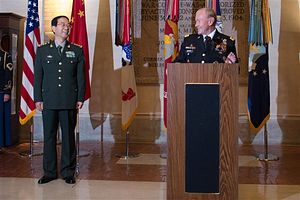General Fang Fenghui, the Chief of the General Staff of the PLA, arrived in Washington, DC today for formal meetings with Chairman of the Joint Chiefs of Staff General Martin Dempsey. According to Dempsey and Fang’s comments during their joint press conference, they held extensive discussions on the military relationship, including counterterrorism, the Senkaku/Diaoyu Islands, and the territorial disputes in the South China Sea.
The latter issue was on everyone’s minds, as Vietnam and China are embroiled in tensions over a Chinese oil rig near the Paracel Islands. Popular opposition has even sparked anti-China riots in Vietnam. The U.S. and China traded barbs in statements about who is to blame for the current situation. The U.S. State Department, including Secretary John Kerry, has called China’s placement of the oil rig “provocative.” Chinese Foreign Ministry spokesperson Hua Chunying fired back, saying “It is nothing but the wrong words and actions made by the U.S. side on maritime issues that have emboldened some countries to take provocative actions.”
The topic came under intense discussion at the joint press conference. In response to a reporter’s question, Fang repeated China’s official stance that the oil rig is within China’s waters and thus the activity is normal and legitimate. Fang also added some interesting details, such as that the placement of the oil rig had been “carefully selected” to minimize the chance of a dispute. According to Fang, China was surprised and dismayed at the reaction. He pointed out that other countries (referencing Vietnam) have previously drilled in the region without a similar backlash.
However, Fang underlined China’s commitment to both its territory in general and the oil rig in particular. On territorial issues, Fang said, China “will not give an inch” and he warned that China has the means to back up its words with actions. On the oil rig, Fang promised that “we will make sure this well is successfully drilled” without interference from the outside. He said China was willing to discuss the issue with Vietnam but would not cease the drilling activity.
When it was his turn to field questions about the Vietnam-China spat, Dempsey went over some of the issues he had discussed with Fang previously. “We have to acknowledge that there are disputes, territorial disputes, that are in play here,” Dempsey said. China has insisted the area where the oil rig is located is not under dispute. Dempsey also said he had discussed with Fang that the use of military assets to resolve disputes is provocative. Finally, Dempsey suggested that the interpretation of what, exactly, is the “status quo” in disputed regions may be up for debate.
Despite the tensions, both Fang and Dempsey refrained from being overly critical of each other’s countries (although Fang had tough words for Vietnam, Japan, and the Philippines). Hagel refrained from specifically labeling China as a provocative actor in the South China Sea, even when asked to do so by a reporter. While Fang, taking the usual Chinese position, blamed the U.S. “rebalance to Asia” for an increase of tensions, he implied that this was unintentional on the part of the U.S. Instead, he blamed regional actors for taking advantage of the policy for their own ends. Still, Fang warned that tensions over the South China Sea could have an impact on the U.S.-China military relationship.
Fang and Hagel promised to “strive for a common security and a common prosperity,” and to build a “healthy, stable” military relationship between the U.S. and China. As part of this, they announced that Washington and Beijing are seeking to create standards of conduct for both aerial and maritime encounters. The two countries also plan to create a video teleconferencing platform linking their two militaries.

































